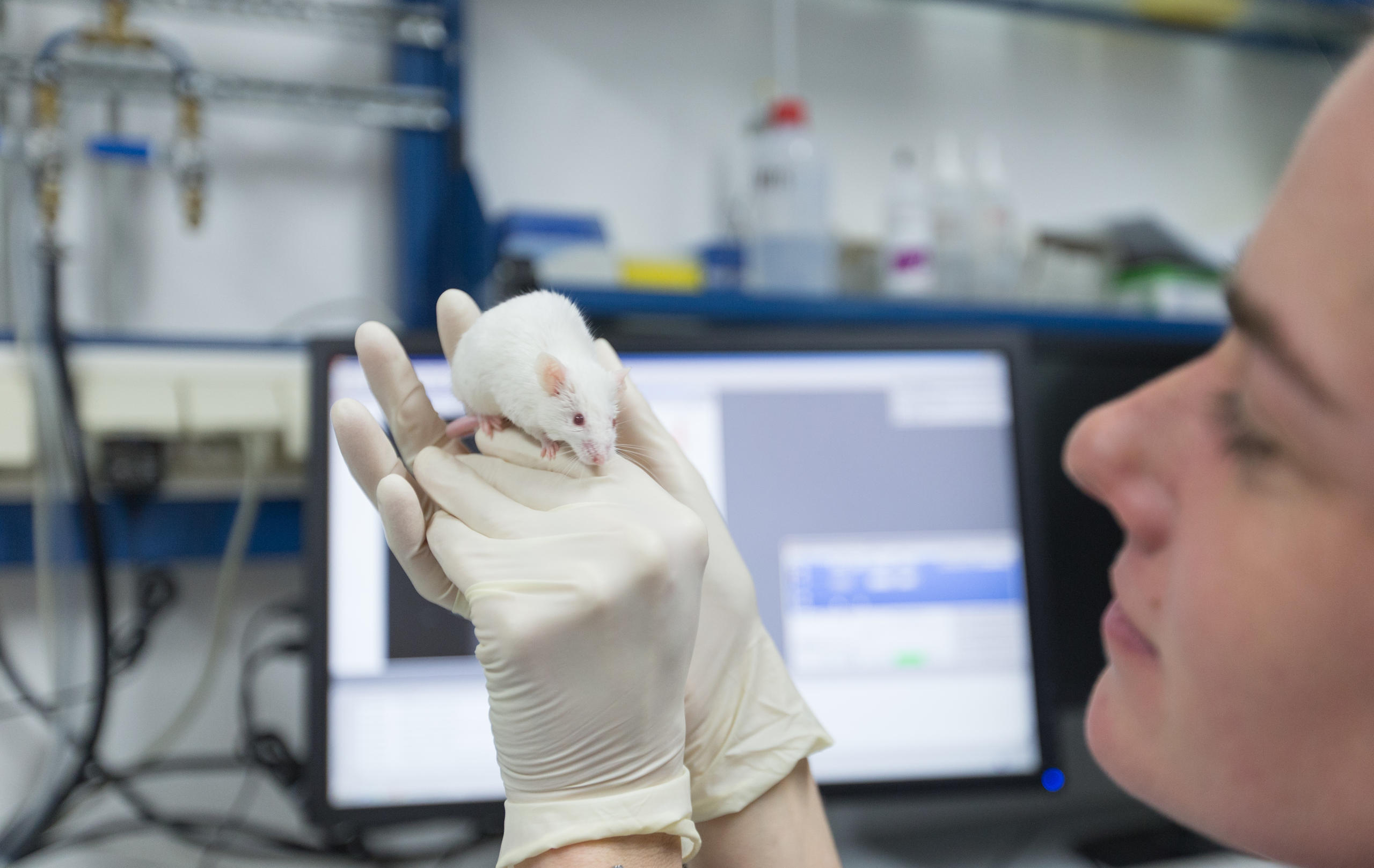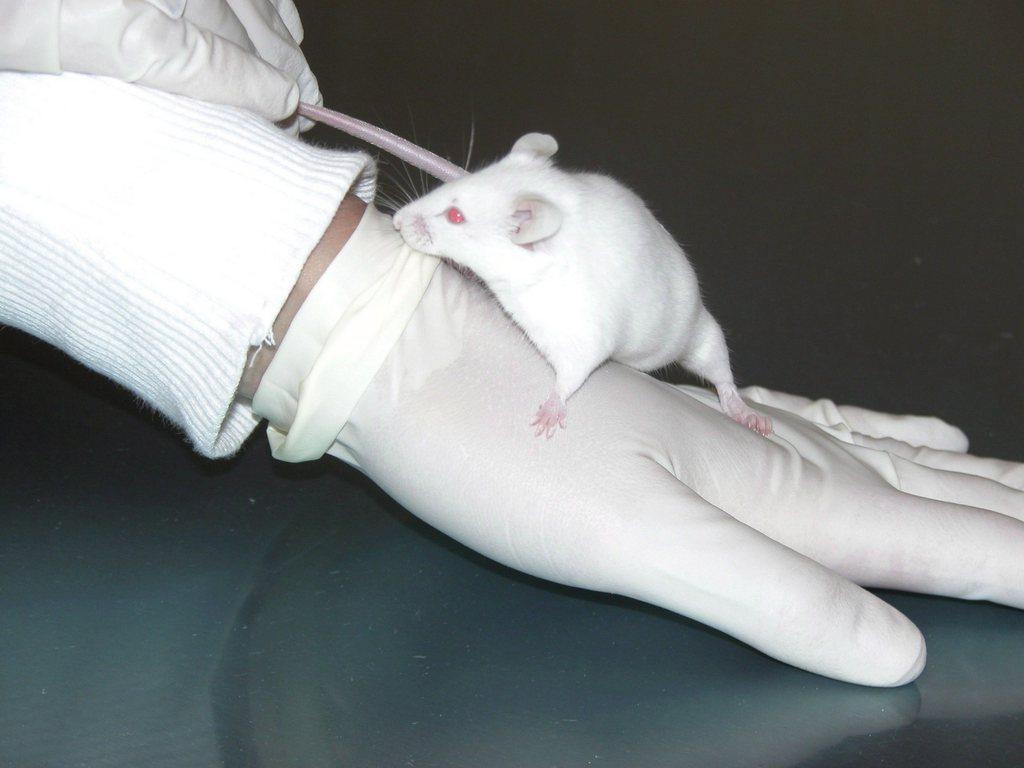Should journalists be more critical of research involving animals?

Scientists have been using animal models to develop life-saving human treatments for centuries, but some question the usefulness – and ethics – of comparing results between species. An anti-animal testing advocate and a science journalist address the Swiss media’s role in the controversy.
On January 8, readers of Switzerland’s Neue Zürcher Zeitung who flipped to page 11 might have seen the full-page ad with the words “Wissenschaftsjournalismus” (German for “science journalism”) emblazoned across the top in red letters. Below two stern-looking caricatures, a thought bubble read, “As science journalists, we have never written anything critical about animal testing.”
The ad went on to argue that, through a lack of critical reporting on the “dangers and failures” of animal testing, science journalists are misinforming the public about the “supposed usefulness and necessity” of experiments using animals.

More
Lab collaboration could boost reproducibility of animal experiments
From animal testing to activism
The source of the ads is the Zurich-based Association for the Abolition of Animal Experiments – and someone with first-hand knowledge of the role of animal models in science. As a postdoctoral researcher at the Basel-based Hoffmann La-Roche Institute for Biomedical Research in 1988, the association’s president, Christopher AndereggExternal link, routinely used mice, rats, and rabbits in his work.
But Anderegg soon changed his mind, after reading about the ethics of animal experimentation in science at the urging of his wife.
“It took me about a year to come to terms with the fact that I just couldn’t justify doing what I was doing, that I couldn’t with a good conscience continue killing animals for the sake of my own career,” Anderegg told swissinfo.ch.
In 1989, Anderegg resigned just three days into a three-year postdoctoral position in immunology and virology at the University of Zurich, and has worked ever since to convince journalists and the public to be more critical of the use of animals in the experiments behind some of Switzerland’s biggest science news stories.
“[Science journalism] is so unbalanced and skewed in favour of researchers and their claims of success, their promises of cures.” – Christopher Anderegg
Media, models, and morals
For Anderegg, the “myth” of animal experimentation in science is that tests done on animals are useful for informing how a drug or vaccine will affect a human. He argues that using rats and mice to develop drugs for humans has more to do with practicality – the convenience of housing in a lab and anaesthetisation, for example – than with the transferability of results from animals to humans.
“For me, animal experimentation is human medicine based on veterinary medicine and that’s just fundamentally wrong,” Anderegg summarises.
The ethical issues raised by Anderegg’s argument aren’t limited to the value of human life versus that of non-humans: they also include questions of journalistic integrity and the media’s responsibility to provide balanced coverage of research involving animals. And in this regard, Anderegg believes the media – at least in Switzerland – have failed miserably.
“[Science journalism] is so unbalanced and skewed in favour of researchers and their claims of success, their promises of cures,” Anderegg says, adding that journalists must stop acting as “cheerleaders” for animal experimentation through one-sided reporting.
He says that one thing journalist should be doing more is following up on their stories about research involving animals.
“There’s practically never any follow-up years later [by journalists]…to show that now success was achieved at the human level,” he says. “As a journalist, I would ask: to what extent are these results transferable to the human being?”
A journalist’s perspective
Olivier Dessibourg, president of the Swiss Association of Science JournalismExternal link, agrees with Anderegg that science journalists have a professional and ethical responsibility to report all sides of scientific research.
“Any science journalist should present to readers the real facts, after a fact-check; including, on one side, the reasons why animal testing is the only way in some cases to advance science and, on the other side, criticisms based on sound reasoning,” Dessibourg tells swissinfo.ch.
“I would say that the field of animal experimentation is properly covered by the Swiss community of science journalists. And please, let’s also trust the members of public, who are not total fools!” – Olivier Dessibourg
He adds that science journalists should maintain a “healthy scepticism” toward scientific results in general, and those involving animal experiments in particular. For example, journalists, he says, should be asking scientists whether animal models are absolutely necessary in their work, or whether other techniques couldn’t be used, in accordance with Switzerland’s “3RExternal link” policy for minimising the use of animals in research.
But this where the journalist’s corroboration of Anderegg’s arguments ends.
“I totally disagree with the paid advertisement text published by Christopher Anderegg; namely that journalists, as a group, publish only one-sided reports about animal experimentation,” he says.
Dessibourg, who notes that he has seen Anderegg’s ad, largely unchanged, in Swiss newspapers since the beginning of his career in 2000, says the argument is not only “disrespectful” towards the Swiss science journalism community, but also questionable in its reasoning.
“Mr Anderegg uses in his own discourse exactly the same methods for which he criticises Swiss science journalists in their coverage of animal testing: an unchanging, narrow, partial, and unsound representation of the situation.”
Switzerland has some of the strictest animal experimentation regulationsExternal link in the world, and the protectionExternal link and dignityExternal link of animals is codified in the Swiss constitution. The Federal Food Safety and Veterinary Office enforces the “3R” policy of replace, reduce, refineExternal link when it comes to using animals in research, meaning that “animal experimentation should only be allowed if no alternative methods are available for answering scientific questions” and “the number of laboratory animals and the distress that they suffer must be kept to a minimum”.
In 2016, the Office commissioned a studyExternal link on the scientific validity of animal testing. While the results highlighted problems with the authorisation proceduresExternal link and scientific rigourExternal link in animal experiments in Switzerland, they “did not directly confirm the scientific validity” or “put into question the utility of” animal experiments.
A “broad review of recent Swiss media coverage”, Dessibourg argues, provides evidence that journalists are not, as Anderegg claims, derelict in their responsibility to balanced science coverage. On the contrary, he says he believes there is a tendency toward more critical articles in the Swiss press on the subject of animal experiments.
“These articles make the public fully aware of the challenges of this field, if not its failures,” he says, referencing recent Swiss coverage of improper treatment of rodent modelsExternal link in France, Volkswagen’s use of monkeys to test the effects of vehicle exhaust fumes in GermanyExternal link, and of a Fribourg lab that used monkeys to study the effects of cocaine. External link
Dessibourg acknowledges that maintaining balanced journalistic coverage of science is not to be taken for granted: it requires time, effort, and vigilance to avoid oversimplifying the complex or controversial aspects of a story.
“There still is a tendency amongst journalists in general to not treat science news the same as political or economic news, because it is complex and therefore hard to grasp, or because science is simply considered trustworthy per se,” he says. “But problems of fake news, misconduct, and exaggeration of results exist in science, and animal experimentation too; it’s of course the journalists’ responsibility to include these aspects when they appear.”
However, he reiterates his belief that the Swiss science journalism community is currently fulfilling its obligation in this sense, adding that members of the public who consume and engage with the media also play a role in the debate.
“To sum up, I would say that the field of animal experimentation is properly covered by the Swiss community of science journalists. And please, let’s also trust the members of public, who are not total fools!” he says.
With organisations like Anderegg’sExternal link and PETAExternal link speaking out against animal experimentation on one side, and those working to promote public awareness of the importance of animal models in science and medicine like the Basel Declaration SocietyExternal link on the other, clear and unbiased data on the validity of animal experimentation for understanding human biology is scarce.
According to the German Reference Centre for Ethics in the Life SciencesExternal link, there are clear examples in history of both the failures and successes of animal experiments in understanding human health, but whether the successes justify the use of animal lives for human purposes remains a fundamentally moral question.
As technology advances, other methods – such as in-vitro tissue and organ cultures and computer simulationsExternal link – show promise for replacing animal models in scientific research. However, it remains to be seen whether such methods will be effective and economical enough to replace animals entirely, particularly in pharmaceutical development and clinical research pipelines.

In compliance with the JTI standards
More: SWI swissinfo.ch certified by the Journalism Trust Initiative














You can find an overview of ongoing debates with our journalists here . Please join us!
If you want to start a conversation about a topic raised in this article or want to report factual errors, email us at english@swissinfo.ch.